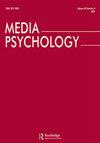暴力电子游戏能减少攻击性吗?亲社会与合作的作用
IF 2.6
2区 心理学
Q1 COMMUNICATION
引用次数: 1
摘要
摘要电子游戏已经成为人们日常生活中不可或缺的一部分。尽管在之前的研究中已经证明了消极游戏因素的有害结果,但普遍存在的积极游戏因素的影响,例如亲社会性和合作,仍不清楚。本研究通过探究亲社会性和合作性,考察了暴力电子游戏中积极游戏因素对攻击行为的影响。基于一般学习模型,实验1考察了亲社会性对攻击行为的影响以及感知暴力在游戏中的中介作用。实验2考察了暴力电子游戏中的合作与攻击行为之间的关系、敌意解释偏见的中介作用以及游戏结果的调节作用。实验1的结果表明,亲社会性对攻击行为没有影响。实验2的结果表明,合作减少了攻击行为。此外,实验2还发现,敌意解释偏差介导了合作与攻击行为之间的关系,输赢结果调节了合作与侵略行为之间的联系。考虑到事后敏感性分析提出的问题,未来的研究可以通过更大的样本量来调查暴力电子游戏中积极游戏因素对攻击行为的影响。本文章由计算机程序翻译,如有差异,请以英文原文为准。
Do Violent Video Games Reduce Aggression? The Roles of Prosociality and Cooperation
ABSTRACT Video games have become an integral part of people’s daily life. Though detrimental outcomes of negative game factors have been demonstrated across previous studies, the effects of prevalently-exist positive game factors, for example, prosociality and cooperation, remain unclear. This study examined the effects of positive game factors in violent video games on aggressive behavior by exploring prosociality and cooperation. Based on the General Learning Model, Experiment 1 examined the effect of prosociality on aggressive behavior and the mediating role of perceived violence in the game. Experiment 2 examined the relation between cooperation in violent video games and aggressive behavior, the mediating role of hostile interpretation bias, and the moderating role of the game result. The results of Experiment 1 showed that prosociality did not influence aggressive behavior. The results of Experiment 2 showed that cooperation decreased aggressive behavior. Additionally, Experiment 2 also found that the hostile interpretation bias mediated the relation between cooperation and aggressive behavior, and win/lose results moderate the relationship between cooperation and aggressive behavior. Considering the questions raised by post hoc sensitivity analysis, future studies could investigate the effects of positive game factors in violent video games on aggressive behavior with a larger sample size.
求助全文
通过发布文献求助,成功后即可免费获取论文全文。
去求助
来源期刊

Media Psychology
Multiple-
CiteScore
8.60
自引率
7.10%
发文量
30
期刊介绍:
Media Psychology is an interdisciplinary journal devoted to publishing theoretically-oriented empirical research that is at the intersection of psychology and media communication. These topics include media uses, processes, and effects. Such research is already well represented in mainstream journals in psychology and communication, but its publication is dispersed across many sources. Therefore, scholars working on common issues and problems in various disciplines often cannot fully utilize the contributions of kindred spirits in cognate disciplines.
 求助内容:
求助内容: 应助结果提醒方式:
应助结果提醒方式:


